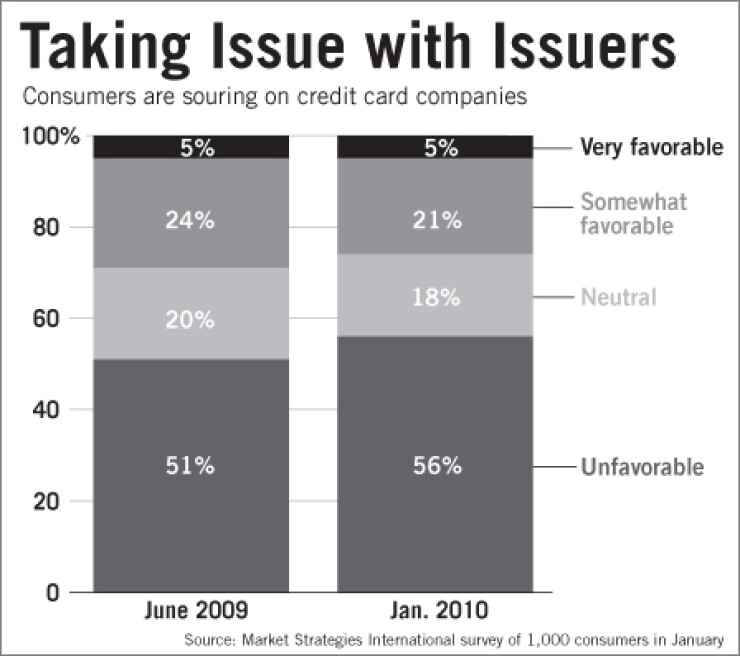-
Today, after nine months of intense and sometimes-frantic preparation, credit card issuers must be in compliance with most provisions of a law that fundamentally changed some industry practices.
February 19 -
For today's consumers, there's nothing like cash on the barrelhead — and that's giving Visa Inc., with a stronger debit card foothold than MasterCard Inc., an advantage in the competition for card transactions.
February 4 -
The credit card law enacted last spring to end some industry abuses has indirectly prompted other anti-consumer practices, according to a report by the Center for Responsible Lending.
December 10


Many consumers are switching back to cash from paying with plastic, a survey says, as unhappiness with bank bailouts continues to sour Americans on the financial industry — and its products.
About 42% of consumers are using more cash than they were a year ago, according to the survey, due out Monday from the consulting firm Market Strategies International. (Thirty-nine percent of the 1,000 respondents polled in January said they were using less cash than a year earlier, and 19% said they do not use cash.)
"It's not that it's just shifted from credit to debit cards, it's shifted to real cash. There's almost a Depression-era mentality," said Mark Willard, a senior vice president at Market Strategies and head of its financial services division.
"This fundamental insecurity has really shaken everything," he said, including consumer confidence in the banks that hold their deposits. "Logically, debit should be the same as cash — unless you have a concern about the institution where you're putting your money."
That finding contrasts with what the payments industry has long called the dominant trend, of consumers shifting their spending away from cash and checks to credit and debit cards.
"That doesn't line up at all with what we've seen," said James Van Dyke, the founder and president of Javelin Strategy and Research. "We certainly found, first that credit card usage was going down tied to the recession, and we've been reporting for a few years that debit was overtaking credit, but we're not seeing a widespread switch from credit back to cash."
Van Dyke also said the new survey's findings could be partially attributed to the fact that "cards are used exclusively for purchases (which define a recession with their downturn)" while cash "can also include nonpurchase activities that are more resilient in any economy."
Javelin research showed that credit usage dropped significantly over the past three years, from 87% of consumers surveyed in 2007 to 56% in 2009. Debit grew by 9 percentage points, to 66%, in 2008, but then fell 10 percentage points by 2009. The overwhelming majority of the 8,000 consumers Javelin surveyed each fall said they had used cash in the past 30 days: That number grew by 6 percentage points in 2008, to 95%, though it slipped to 91% in 2009.
Visa Inc. and MasterCard Inc. regularly tout that long-term shift from paper currency to plastic. For example, Joseph Saunders, Visa's chairman and chief executive officer, said in February that the company's quarterly profits were indicative of "the continuing secular shift to electronic payments, especially debit."
Chris Monteiro, a MasterCard spokesman, said it had not "experienced" any loss of transactions to cash. "Although people may have been spending less, they still relied more heavily on our products while doing it," he said.
Visa, similarly, reiterated via email, "There is an unmistakable secular shift taking place, with consumers moving away from cash and checks toward digital currency."
Market Strategies also found that the Troubled Asset Relief Program has done little to alleviate the ongoing consumer uncertainty and anger over the state of the economy. Only 12% of respondents said that the initial bank bailout had a positive impact on them or their families, and 58% said the bailout did not have a positive impact on either the economy or their own lives.
"The bailout issues tie to people's concerns about jobs, what's happened, has this really helped their state of affairs," Willard said. "There's an underrealization on the part of the consumer just how precarious this was" when the bailout started, which leads to "people getting immune to what they see as people crying wolf" about the banking crisis.
Other recent developments have hurt the reputation of banks, especially that of card issuers, among consumers.
The percentage of consumers who have an "unfavorable" view of the card industry increased by 5 percentage points over the past six months, to 56%, while only 26% of consumers viewed it somewhat-to-very favorably, according to the survey.
Willard attributed that sentiment to "all of the negative press around the perceived predatory practices of the industry," as well as the Credit Card Accountability, Responsibility and Disclosure Act. Signed by President Obama in May, the law drew attention to the practices it outlawed.
"That hit pretty hard and was a pretty big deal," Willard said.
The industry's pullback from consumer lending has also tarnished its public image. In June, 8% of respondents said they had applied for a new credit card, and 11% of those applicants were denied credit, Market Strategies said. By January, 13% of respondents said they had applied for a new card — and 31% of those applicants were denied. "With this high rate of rejection, the banks are essentially training consumers not to get credit cards," Willard said. "I think this is a very dangerous area for the banks, because cards can also be a gateway product" to other financial products and services from the same institution.
Market Strategies, of Livonia, Mich., collected the survey data over three days through online interviews with the consumers.





